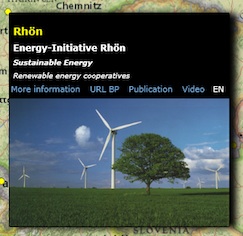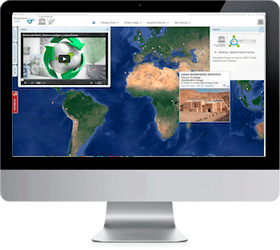Renewable energy cooperatives in Rhön biosphere reserve.
 “What’s impossible for the individual can be achieved by many.” This cooperative principle from the nineteenth century neatly sums up the approach taken by the people managing the Friedrich Wilhelm Raiffeisen Energie eG (FWR). How can we combat climate change? What can we do locally to ensure our own energy self-sufficiency in future? And what role can environmentally friendly and sustainable solutions play in regional development?
“What’s impossible for the individual can be achieved by many.” This cooperative principle from the nineteenth century neatly sums up the approach taken by the people managing the Friedrich Wilhelm Raiffeisen Energie eG (FWR). How can we combat climate change? What can we do locally to ensure our own energy self-sufficiency in future? And what role can environmentally friendly and sustainable solutions play in regional development?
The cooperative was founded in Bad Neustadt an der Saale in June 2008. Here in the Franconian Rhön region, groups of individuals are busy promoting cooperatively owned facilities that generate renewable energy. The cooperative provides private individuals wishing to invest in renewable energy sources and support their use through modest financial contributions with the chance to link up with like minded people.
This not only concentrates available capital, but also legal and economic expertise. After all, not every one has the necessary expertise and experience required for the construction and operation of such facilities.
An energy cooperative not only pools the interests of private individuals, but also motivates the owners of suitable rooftops to have photovoltaic systems installed. A farmer may toy with the idea of installing a system like this on one of his barns, but frequently the effort and risk required is too great to consider going it alone, especially if the project is likely to entail considerable investments additionally to his farming ones. The investment project would not only considerably restrict his financial flexibility for his core business of farming, it would also involve administrative and insurance costs, not to mention associated risks none of which should be underestimated.
Cooperatives offer a major advantage in that they can tap into the potential of sites to which private individuals would never gain access on their own. In rural areas there are plenty of unused rooftops. Lots of churches, supermarkets, farm or community buildings could be fitted out with solar systems. The owners of these rooftops can either allow the FWR to use these areas for free, or rent them to the FWR, even if they themselves do not wish to be financially involved.
The FWR’s first photovoltaic system was installed on roofs belonging to the Bad Neustadt municipal works yard in November 2008. Its peak capacity is 270 kilowatts and it will be producing an estimated 235,000 kilowatt hours of electricity per annum. The average annual electricity needs of 60 private households can be covered by a facility of this size. With a service life of 20 years, the system will save approximately 4,150 tonnes of CO2. Those who invest 4,000 euros in the facility contribute directly to the production of green elec tricity in an amount approximate to that which they consume annually in their own home. Overall nearly 1.1 million euros have been invested in the project. Two thirds have been financed by borrowed capital and one third by equity. Every Bad Neustadt resident is entitled to be involved in the energy project, the minimum share in the investment being 2,000 euros. For each share, one hundred euros goes to the cooperative as a share, while the remaining 1,900 euros are invested as a subordinated loan (20 year maturity) to finance the project. Based on a conservative estimate of electricity yield, the effective interest rate of this investment will be 5.5 per cent per annum. If this estimate is exceeded in sunnier years, every member will be awarded a bonus of up to four per cent. Each of the 38 partners in the Bad Neustadt solar facility has been issued with an energy savings book, reminiscent of a conventional bank savings book. Every year members receive a statement of their account, which they can glue into their energy savings book. The statement records the interest and CO2 saved for the year in question, as well as a comparison of projected and actual figures. It’s a neat way of simultaneously presenting the investment and the individual’s own contribution to environmental protection.
Sources:
![]() Energy Cooperatives: Citizens, communities and local economy in good company. PDF
Energy Cooperatives: Citizens, communities and local economy in good company. PDF
Related project: Energie-Initiative Rhön und Grabfeld e.V. Web site
Projects














